List of mancala games
Games in the mancala family include:
Popular games
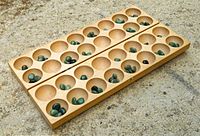
A modern, European Bao/Omweso board with jade gemstones
The most widely played games are probably:
- Bao is a complex strategy game of Kenya and Zanzibar, played on a 4x8 board.
- Kalah is the ruleset usually included with commercially available boards; however, the game is heavily biased towards the first player, and it is often considered a children's game. The board is 2x6 with stores.
- Oware, the national game of Ghana, is also known by Warri, Ayo (Yoruba Name. Nigeria), Awele, Awari, Ouril, and other names. It has relatively simple rules but considerable strategic depth. The board is 2x6 with stores.
- Omweso (also known as coro) is a strategic game of Uganda, played on a 4x8 board.
- Pallanguzhi is played in Tamil nadu, Southern India with 2 x 7 stores. Two varieties of this game are popular, Kaashi and Bank.
Games with unusual features
- Bohnenspiel is a German mancala based on a Persian game not unlike some African mancala variants. The board is 2x6 with stones.
- Eson xorgol, a game played by the Kazakh minority in western Mongolia, is traditionally played with goat feces. The board is 2x5.
- //Hus is a Namibian game. The board is 4x8.
Non-traditional games
- Conga (Martin Franke; Germany)
- Cups (Arthur Amberstone and Wald Amberstone; United States: New York)
- The Glass Bead Game (Christian Freeling) is a complex mancala-style game with different colored stones.
- Oh-Wah-Ree is a commercial variant of oware with provision for more than two players.
- 55Stones is a modern mancala game with simultaneous moves.
- Kauri is a modern mancala game with two kinds of seeds.
- Space Walk is a modern boardgame with mancala mechanic.
- Trajan is a modern boardgame variant with mancala mechanic.
- Five Tribes is a modern boardgame variant with mancala mechanic.
Traditional games
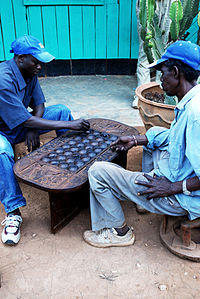
Omweso (or Igisoro) players in Kigali, Rwanda
- Abangah (the Azande of Sudan) The board is 2x8 with stores.
- Agsinnoninka (Philippines)
- Ali Guli Mane (India - Karnataka)
- Anywoli (Ethiopia, Sudan)
- Aw-li On-nam Ot-tjin (Borneo)
- Aweet (Sudan, Namibia)
- Ba-awa (Ghana) The board is 2x6 with stores.
- Bajangkaq (Sumatra)
- Baqura (Mesopotamia)
- Bay Khom (Cambodia)
- Bau (the Wa Chaga)
- Beatta (Tayma)
- Bohnenspiel (Germany)
- Chanka (India, Sri Lanka)
- Chenna Maaney (In Tulu language, South India)
- Chisolo (Zambia)
- Chonka (Borneo)
- Chongka, or Tchonka (Marianas)
- Choro
- Chuncajon (Philippines)
- Congkak (Indonesia, Malaysia) The board is 2x7 with stores.
- Coro (Ugando)
- Dakon (Java island of Indonesia)
- Dara-dara (Indonesia - Sulawesi)
- Daramutu (Sri Lanka)
- Ellaewala-kanda (Sri Lanka)
- En Gehé (Maasai of Tanzania)
- Gabata (Ethiopia)
- Galatjang (Sulawesi)
- Halusa (Mesopotamia)
- Hawalis (Oman)
- Igisoro (Rwanda - Burundi)
- Ingilith (the Turkana of Kenya)
- Isafu
- Isafuba
- J'erin (Nigeria)
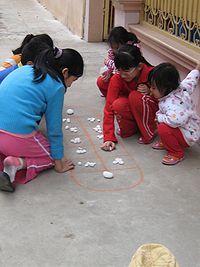
Vietnamese children playing
ô ăn quan
- Kale (Gabon)
- Kaloleh (Sumatra)
- Kapo (Senegal)
- Kanji guti (India - Odisha)
- Kiela (Angola)
- Khutka boia (India - Punjab)
- Kotu-baendum (Sri Lanka)
- Kombe (Kenya)
- Kubuguza
- La'b Madjnuni (Syria)
- La'b Hakimi, or La'b Akila (Syria)
- La'b Roseya (Syria)
- Layli Goobalay (Somalia)
- Li'b al-ghashim
- Longbeu-a-cha (India - Assam)
- Lontu-Holo (the Maroon of Suriname)
- Madji (the Benni of Nigeria)
- Main chakot (Thailand)
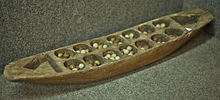
Thai Mancala board (possibly Mai Chakot or Mak Khom), as displayed in the Institute of Southern Thai Studies near Songkhla.
- Mak Khom (Thailand)
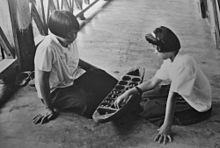
Photograph of two Thai girls playing with a mancala board, possibly the game Main Chakot or Mak Khom.
- Mancala'h (Egypt, Syria)
- Mandoli (Greece - Hydra)
- Mangala (Egypt, Turkey - different rules)
- Matoe (Indonesia - Sumba)
- Mawkar katiya (India - Assam)
- Mbau (Kenya - Kilimanjaro region of the Rift Valley)
- Mechiwa (Bali)
- Mefuvha
- Melegayası (Turkey) The board is 2x9 with stores.
- Mereköçdü (Azerbaycan) The board is a circle of six holes. Each player has 21 stones.
- Meuchoh (Sumatra - Aceh)
- Meulieh (Sumatra - Aceh)
- Meusueb (Sumatra - Aceh)
- Meuta' (Sumatra - Aceh)
- Minkale (Bin Kale) (Turkey)
- Mongale (Kenya)
- Mongola (Congo, Rwanda)
- Naranj (Maldives)
- Nsolo (Zambia)
- Ô ăn quan (Viet Nam) game is 2 mandarin boxes x5 ponds each, with 25 stones or tamarind seeds each
- Obridjie (Nigeria)
- Ouril (Cape Verde)
- Pachgarhwa (India)
- Vaamana Guntalu (Telugu name, India - Andhra Pradesh)
- Pallanguzhi (Tamil of India), also known as Pallankuli.
- Pereauni (Uganda)
- Poo (Liberia)
- Puhulmuti (Sri Lanka)
- Sai (Flores)
- Sat-gol (India)
- Songo
- Sungka (Philippines)
- Til-guti (India)
- Toee (Sudan)
- Toguz korgool (Kyrgyzstan) The board is 2x9 with stores.
- Toguz Kumalak (Kazakhstan); same as Toguz korgool
- Vai Lung Thlan (the Mizo in Mizoram, India)
- Walak-pussa (Sri Lanka)
- Warra (United States)
- Wa-wee (Santa Lucia)
- 散窯 (Sàn yáo) (China - Henan)
- 老牛棋 (Lǎo niú qí) (China - Anhui)
- 分六煲棋 (Fēn liù bāo qí) (China - Guangdong)
COMMENTS

 A modern, European Bao/Omweso board with jade gemstones
A modern, European Bao/Omweso board with jade gemstones Omweso (or Igisoro) players in Kigali, Rwanda
Omweso (or Igisoro) players in Kigali, Rwanda Vietnamese children playing ô ăn quan
Vietnamese children playing ô ăn quan Thai Mancala board (possibly Mai Chakot or Mak Khom), as displayed in the Institute of Southern Thai Studies near Songkhla.
Thai Mancala board (possibly Mai Chakot or Mak Khom), as displayed in the Institute of Southern Thai Studies near Songkhla. Photograph of two Thai girls playing with a mancala board, possibly the game Main Chakot or Mak Khom.
Photograph of two Thai girls playing with a mancala board, possibly the game Main Chakot or Mak Khom.